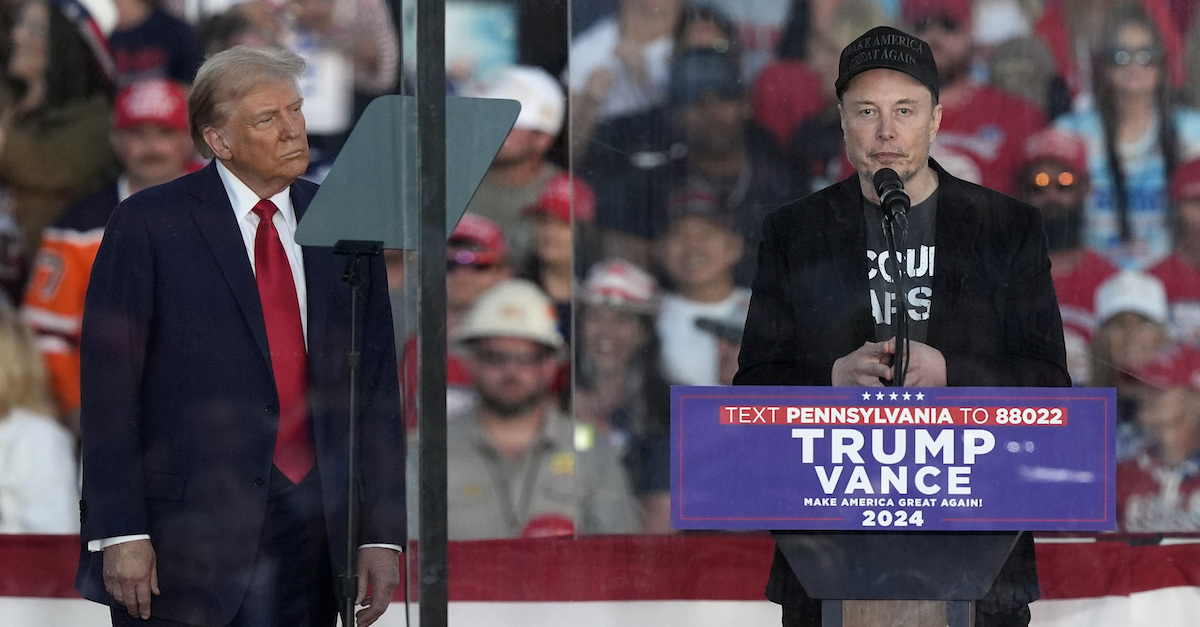
Republican presidential nominee former President Donald Trump listens as Elon Musk speaks during a campaign rally at the Butler Farm Show, Saturday, Oct. 5, 2024, in Butler, Pa. (AP Photo/Julia Demaree Nikhinson, File).
A new federal lawsuit is taking aim at the legitimacy of the Elon Musk-helmed Department of Government Efficiency (DOGE). This time, the challenge to DOGE’s power is about core legal definitions.
The basic thrust of the lawsuit filed Thursday in the U.S. District Court for the District of Columbia is that “DOGE is an advisory committee” that is “separate and distinct from the United States DOGE Service.”
These distinctions, the plaintiffs say, are not picayune.
Rather, such distinctions mean DOGE is more or less operating in secret and in violation of the federal law governing advisory committees, according to the 33-page amended complaint.
As Law&Crime previously reported, DOGE is not truly a department in the federal government. Instead, President Donald Trump issued an executive order tasked with “modernizing federal technology and software to maximize efficiency and productivity” by reducing the number of federal workers and cutting spending. The order also renamed the U.S. Digital Service (USDS) and created an umbrella “temporary organization” with DOGE-affiliated nomenclature.
The relevant section of Trump’s order reads:
There shall be a USDS Administrator established in the Executive Office of the President who shall report to the White House Chief of Staff. There is further established within USDS, in accordance with section 3161 of title 5, United States Code, a temporary organization known as “the U.S. DOGE Service Temporary Organization.” The U.S. DOGE Service Temporary Organization shall be headed by the USDS Administrator and shall be dedicated to advancing the President’s 18-month DOGE agenda. The U.S. DOGE Service Temporary Organization shall terminate on July 4, 2026.
To hear the plaintiffs tell it, the USDS is largely unrelated to DOGE’s high-profile cost-cutting activities throughout the federal government — aimed at certain ideologically disfavored agencies — so far.
“Despite purporting to be the head of DOGE, taking credit for its activities, and making statements based on non-public information available to DOGE, Musk is not the USDS Administrator,” the lawsuit reads.
This means Musk is in charge of something else entirely, the plaintiffs say. And that something else, the lawsuit alleges, is an advisory committee that is governed by the little-noticed Federal Advisory Committee Act (FACA) of 1972.
According to the U.S. General Services Administration:
The [FACA] formalized a process for establishing, operating, overseeing, and terminating these advisory bodies and created the Committee Management Secretariat to monitor compliance with the Act.
Under federal law and regulations, FACA has several non-discretionary, or mandatory, rules for advisory committees. Those rules include filing a charter with the proper authorities, a membership plan that balances specific interests, and strict meeting requirements that promote transparency.
The lawsuit says DOGE has done none of this.
“Upon information and belief, no Defendant has filed an advisory committee charter with any federal agency, any Congressional committee, the Library of Congress, or the GSA Committee Management Secretariat and there are no plans to do so,” the filing reads. “Upon information and belief, DOGE has been operating and holding meetings without a charter and will continue to do so.”
The lead plaintiffs in the novel lawsuit are two lawyers who requested appointment to DOGE. In their job applications, cited in the filing, they highlighted their combined decades of legal experience and familiarity with federal issues. One lawyer cited his perspective as a union member. Another cited his work defending government workers.
Neither plaintiff heard back from DOGE, the lawsuit says.
The filing offers statutory background on the importance of various perspectives and muses that they are unimportant to Musk’s team:
Section 5(b) of FACA requires that any advisory committee, including DOGE, (i) be “fairly balanced in terms of the points of view represented and the functions to be performed by the advisory committee,” (ii) “not be inappropriately influenced by the appointing authority,” and (iii) “not be inappropriately influenced . . . by any special interest.”
DOGE’s stacked membership, far from being fairly balanced, reveals that only one viewpoint is represented: that of “small-government crusaders” with backgrounds in either the tech industry or Republican politics. This shortcoming renders DOGE’s membership imbalanced and unfit for the function is has been directed to perform…
In other words, the lawsuit essentially argues that Musk is running DOGE, an advisory committee, without the required oversight.
The lead attorney representing the plaintiffs, Kel McClanahan, sent Law&Crime an email offering a bird’s-eye view of the lawsuit.
“Sen. James Lankford, a founding member of the Congressional DOGE Caucus, told Fox & Friends the day after the President created the US DOGE Service that DOGE ‘isn’t an agency, it’s an idea.’ I think we should all take the Senator at his word, since he would be in a place to know,” the attorney said. “What we know as DOGE is not the US DOGE Service, and what that means is that when Elon Musk feeds agencies into woodchippers and reverses grant payments, he’s doing so as a private citizen. The entire point of FACA is to make it so private citizens can’t do this type of thing without accountability and transparency, and DOGE has neither. That’s the problem here.”








